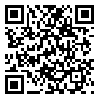BibTeX | RIS | EndNote | Medlars | ProCite | Reference Manager | RefWorks
Send citation to:
URL: http://yafte.lums.ac.ir/article-1-322-en.html
Enablement and acquiring necessary skills among medical students is a main section of medical education. Any problem in clinical education reduced efficacy and efficiency this part of education that could be due to weakness of education in medical universities. Therefore, medical universities initiated clinical skills learning centers. Materials and Methods: This study as an interventional pre-post test performed on interned medical students. Before and after educational course including cardio-pulmonary resuscitation, hemorrhage control, non-invasive ventilation, suturing, insertion of urinary and nose-gastric catheters and administration of local anesthesia, a two- Part questionnaire including demographic and emergency clinical skills was filled for each student. The data were analyzed using statistical tests. Reliability of questionnaire was conformed by some expert scientific staffs and its validity was approved through the pilot study of 20 students with correlation coefficient 0.93 of Cronbach's Alpha Results: This study showed that students after intervention of educational training, in all of the emergency clinical skills including cardio-pulmonary resuscitation, hemorrhage control, non-invasive ventilation, suturing, insertion of urinary and nose-gastric catheters and administration of local anesthesia, have gained desirable and optimal scores in comparison with pre educational training. Conclusion: Our results suggest that training of medical students in actual media for emergency skills improves medical students' knowledge and ability for management and appropriate treatment of patients in emergency centers.
Received: 2011/03/6 | Accepted: 2017/06/7 | Published: 2017/06/7
| Rights and permissions | |
 |
This work is licensed under a Creative Commons Attribution-NonCommercial 4.0 International License. |





